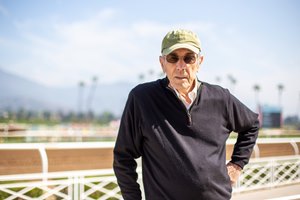CHRB Discusses Impact of Horseracing Integrity Act


During a largely uneventful meeting of the California Horse Racing Board Sept. 24, commissioners discussed the Horseracing Integrity and Safety Act before passing a series of mostly routine motions on its agenda.
Among the most noteworthy of those agenda items was a temporary suspension this fall at Del Mar of a state-mandated retained-syringe rule after Lasix treatment.
Although the meeting lasted more than three hours following public comment by people opposed to racing, few issues resulted in a lengthy debate by commissioners. Instead, it was an opening statement during the early part of the teleconference meeting, in which executive director Scott Chaney discussed the HISA, which drew the most spirited discussion.
Chaney told commissioners of the proposed Act's support by Senate Majority Leader Mitch McConnell and potential for passage through Congress. The legislation is backed by many leading industry groups, including The Jockey Club, the majority owner of BloodHorse.
"I think it is fair to say we have several concerns with this legislation," he said. "One, the language is very ambiguous when it comes to actual details regarding funding, budget, amount of regulatory oversight, and duplication of state regulatory functions; two, the fate and budget of (the laboratory) at UC Davis, one of the premier equine testing laboratories in the world; three, the rollback of California regulations, particularly those related to safety, which are among the strictest in the nation; four, the magnitude of the regulatory function that an authority that does not currently exist is attempting to take on; and five, the incremental costs, which will be passed on to stakeholders.
"To be clear, national standards are a laudable goal, but it is less clear how California, which enjoys a robust, mature, well-funded regulatory structure, will benefit."
Chairman Dr. Greg Ferraro and commissioner Dennis Alfieri echoed concerns about the perceived costs of the Act, some of which could be passed down to horse owners.
"I think we need to stay on the front end of this thing now, instead of the back of the bus," Alfieri said of how the CHRB approaches the federal legislation going forward.
Chaney said he would meet with commissioner Wendy Mitchell to discuss whether the CHRB could work to shape the legislation.
Also during his opening remarks, Chaney reported California handle dropped 4.8% on 16 fewer daytime programs of racing in August, while nighttime racing experienced a 19.6% increase on the same number of race cards compared with the comparable month in 2019. Combined, this resulted in a 3.1% decrease in overall August handle relative to last year.
The decreased racing days last month was partially related to COVID-19 restrictions and business conditions during the pandemic.
CHRB equine medical director Dr. Rick Arthur said tracks in the state were able to safely operate amid a heatwave this summer, and that tracks monitored air quality issues related to smoke from wildfires in the state.
Last month there were four fatalities from racing and two from training at CHRB-monitored facilities, and four non-exercise-related fatalities in stable areas, according to Arthur. One of those racing fatalities resulted in a one-horse spill at Los Alamitos Race Course that left jockey Vinnie Bednar with lower-limb paralysis.
Los Alamitos, which runs a mixed meet of Quarter Horses and lower-level Thoroughbreds during its evening programs, has seen a spike in catastrophic injuries this year, which the CHRB addressed in an emergency meeting this summer.
